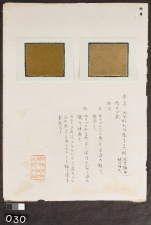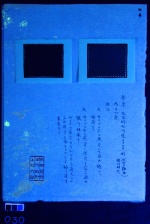Difference between revisions of "Nurude (Japanese sumac) - right (30 R)"
Jump to navigation
Jump to search
(username removed) |
(username removed) |
||
| Line 5: | Line 5: | ||
| 30 | | 30 | ||
|- | |- | ||
| − | ! scope="row"| | + | ! scope="row"|Uemura number / title |
| − | | | + | | ; "Haze-some 25" |
|- | |- | ||
! scope="row"|Folder location | ! scope="row"|Folder location | ||
| Line 44: | Line 44: | ||
| - | | - | ||
|- | |- | ||
| − | ! scope="row"| | + | ! scope="row"|Uemura's notes |
| − | | One of the dyeing techniques, which had been used since the 8th century AD. in Japan. The dyestuff yields pale yellow when extracted in neutral to alkaline condition without use of mordant. | + | | One of the dyeing techniques, which had been used since the 8th century AD. in Japan. The dyestuff yields pale yellow when extracted in neutral to alkaline condition without use of mordant. "". |
| − | " | ||
|- | |- | ||
| − | ! scope="row"| | + | ! scope="row"|Uemura's date |
| Kyoto Murasakino | | Kyoto Murasakino | ||
|} | |} | ||
| − | [[Category: | + | [[Category:Uemura dye archive]] |
Revision as of 06:16, 24 July 2013
| Museum number | 30 |
|---|---|
| Uemura number / title | ; "Haze-some 25" |
| Folder location | 1st shelf |
| Sample location | right (30 R) |
| Fiber type | silk |
| Color | brown (slightly dull) |
| Dyestuff (Japanese common name) | ぬるで : Nurude |
| Dye (English common name) | Japanese Sumac |
| Dyestuff (botanical name) | Rhus javanica L. var. chinensis (Mill.) T. Yamaz. (R. chinensis Mill.) |
| Plant part | heartwood /dried |
| Dyestuff extraction | boiled in water |
| Auxiliary agent in dye bath | - |
| Mordant | iron |
| Other auxiliary agent | - |
| Uemura's notes | One of the dyeing techniques, which had been used since the 8th century AD. in Japan. The dyestuff yields pale yellow when extracted in neutral to alkaline condition without use of mordant. "". |
| Uemura's date | Kyoto Murasakino |

